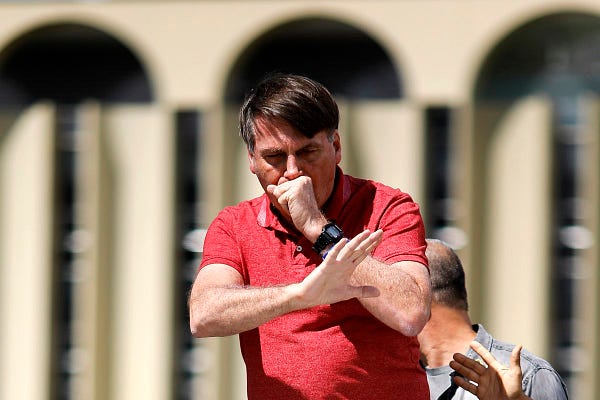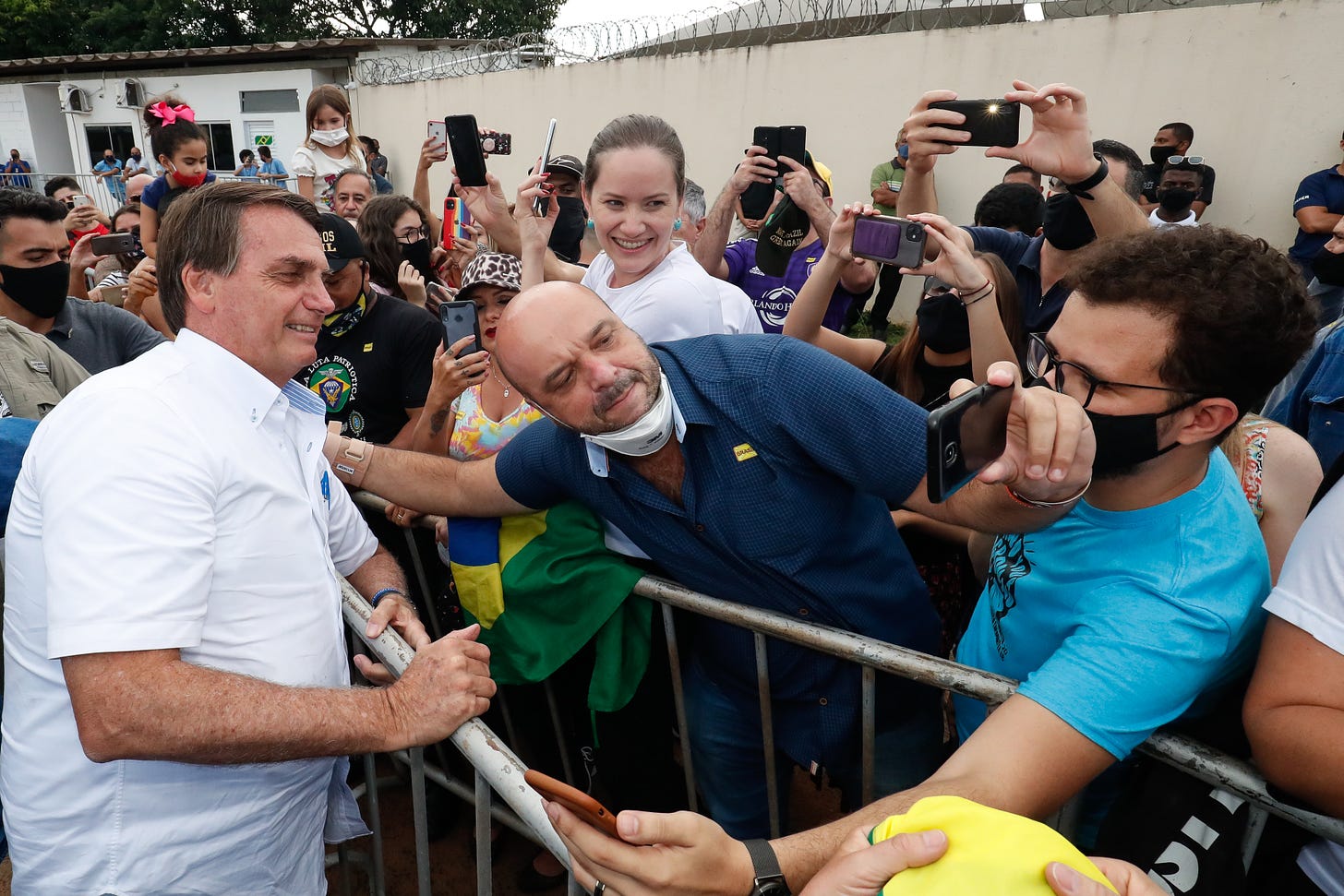Meanwhile in Brazil
Fingers point at Brazil far-right president as healthcare structures collapse under new variant strain
In a rush? No worries! The most important bits are in bold. Skim ahead!
One year into the COVID-19 pandemic, Brazil is facing a nightmare scenario. This past week, Johns Hopkins University reported 514,863 new cases and 15,813 new deaths in South America’s most populous nation, a record high that leaves Brazil second only to the United States in the global case and death tally. The immediate blame for the current spike could be the new virus strain. But a year of misinformation and pandemic mismanagement by the Brazilian government has made a bad situation worse, leaving thousands helpless and forcing the healthcare system into what one institute calls, the “worst crisis in its history.”
What is the Brazil COVID-19 variant?
As a virus spreads widely and infects more host bodies, it tends to mutate. “When a virus infects a human cell, its main job is to replicate and then spread,” explained Dr. Amir Khan to Al Jazeera. During this rapid replication process, an error may occur, leading to mutations. While some mutations may be benign, the more the virus spreads, the greater chances of an “advantageous error” occuring, errors that “might make the original virus more powerful or infectious.” The Brazilian P.1 variant was first discovered in early January in the Amazonian city of Manaus but researchers believe the strain probably emerged in November and has been spreading since. Studies claim the new variant is more contagious and can reinfect those who may already have some immunity to the original COVID-19 strain. Infection rates in Manaus shot up by 125 percent between January 7 and 22, according to the National Council of Health Secretaries.
War rages on in hospitals
The second wave has landed Brazil in its worst crisis yet. Practically all 26 states are nearing full capacity in intensive care units. Hermeto Paschoalick heads a critical care unit in a public hospital in the state of Mato Grosso du Sul, one of Brazil’s worst-hit states. He told The Guardian, “things are desperate,” as his hospital is at 93 percent capacity, leaving doctors and staff exhausted and extremely distressed. Hospitals in other cities in Mato Grosso du Sol, like Campo Grande, are stretched so thin, ambulances are being converted into mini-clinics. “The patients are arriving from small towns in the interior and there’s nowhere to put them—so they just keep them in ambulances,” Paschoalick said. Clinics that are at capacity have placed COVID patients into wards not originally designated to them. As patients travel “hundreds of miles'' across the country in search of vacant beds, nurses are manually pumping oxygen into those who don’t have but desperately need a ventilator. Many cannot accept any new patients, leaving people stranded.
The load is made heavier still as the P1 appears to be increasingly able to infect younger people, a dangerous differentiation from the original virus. A study of the new strain led by Felipe Naveca, a researcher at the Oswaldo Cruz Foundation, found the P1 strain can carry a viral load about 10 times higher than the original virus. But scientists led by Nuno Faria, a professor of virus evolution at Oxford University and Imperial College London, stopped short of linking the new strain to rising infections and mortality among younger people. They wrote, “the recent epidemic in Manaus has strained the city’s healthcare system, leading to inadequate access to medical care,” so they “cannot determine whether the estimated increase in relative mortality risk is due to the P.1 infection, stresses on the Manaus healthcare system, or both,” until further clinical studies are conducted.


Those on the ground, however, say there is a visible change in the types of patients coming in across Brazil. Marcos Boulos, an infectious disease professor at the University of São Paulo, told The Guardian that the scenes in hospitals showed some correlation. “Here in the hospital we’ve got a 20-year-old woman in our ICU in serious condition. Today you have serious patients in ICU from all age groups. Before we’d say it was almost 90% elderly,” he said. “There’s no other reason why young people would suddenly start suffering from a more serious disease.” According to São Paulo’s health secretary, Jean Gorinchteyn, people under 50 are occupying half of the ICU’s capacity in several hospitals across the state. Notably, Brazil’s crisis poses threats beyond its borders. “If Brazil is not serious, then it will continue to affect all of the neighborhood there — and beyond,” said Tedros Adhanom Ghebreyesus, director general of the World Health Organization. “This is not just about Brazil. It’s about the whole Latin America, and even beyond.”
Deny, dismiss, dissuade



Brazil did not fall into a state of chaos only after the P.1. strain emerged. Over the course of this pandemic, Brazil’s far-right President Jair Bolsonaro has maintained a position of skepticism and dismissal of COVID, quickly dismissing the need for precaution as “hysteria”. After he called the virus “a little cold” last March, frustrated Brazilians protested from their homes, banging pots and pans from balconies and chanting “Bolsonaro out”. Later that month, government supporters rallied against lockdowns and demanded they be allowed to return to work. At that time, Brazil had nearly 3,000 confirmed COVID cases and 77 deaths. In April, Bolsonaro himself joined mass anti-lockdown demonstrations, where his supporters demanded state governors dissolve lockdown and social distancing restrictions. By now, Brazil had the highest case count in South America- over 38,000 infections. Even when Bolsonaro contracted COVID in July, he continued to denounce social distancing measures and touted unproven remedies like the malaria drug hydroxychloroquine which his northern counterpart then U.S. President Donald Trump took as well.
Go deeper: Jair Bolsonaro: the president who ‘ordered his country to die’
One year later little has changed about Bolsonaro’s attitude. Earlier this month he told people to “stop whining,” about the pandemic. On Thursday, he continued questioning the crisis, saying the situation has become a “war against the President.” In a maskless address to supporters outside the presidential palace, Bolsonaro said, “of course, we want a solution and regret any death, but why did the lockdown exist? You are seeing the population suffering from unemployment. Introduce me to a country where the fight against the COVID is working.” More proof of chaotic internal mismanagement appeared when Bolsonaro appointed a new health minister last week, the fourth since the pandemic began. Dr. Marcelo Queiroga, a cardiologist, replaced army general Eduardo Pazuello, who is currently under investigation by Brazil’s top courts for alleged neglect in Amazonas state, where exhausted oxygen supplies led to the healthcare system’s collapse. The first two ministers were sacked after they questioned Bolsonaro’s leadership and COVID policies.
What about vaccines?
Compared to other major countries, Brazil is falling behind in the innoculation drive. According to AP, so far, only 5.5 percent of Brazil’s population has been vaccinated. Under the influence of President Trump, U.S. health officials urged Brazil to reject the Russian-made Sputnik V vaccine. Now that studies have proved the Sputnik V is just as effective as the Pfizer-BioNTech and Moderna vaccines, Brazil’s choice to reject Russian diplomacy and vaccines proved to have deadly consequences. On Friday, Brazil’s health ministry announced it reached a deal to receive 10 million doses of Sputnik V. Bolsonaro’s government has also requested China to supply vaccines and materials to produce the vaccine in Brazil. Just last year Bolsonaro “disparaged the Chinese vaccine while it was undergoing clinical trials in Brazil and shut down an effort by the health ministry to order 45 million doses,” reported The New York Times.

Translation of second bullet point: The Brazilian people WON’T BE ANYONE’S GUINEA PIG
Former Brazilian President Luiz Inacio Lula da Silva called on President Joe Biden to share the U.S.’ surplus vaccines with countries in need. In an exclusive interview with CNN, da Silva said, “the responsibility to international leaders is tremendous so I’m asking President Biden to do that because I can’t… I don’t believe in my government.” The chaos erupting from Bolsonaro’s government leaves an opportunity for da Silvia to run against him in Brazil’s general elections next year.
What I did not cover but needs more attention
The last living man of the Juma people in Brazil has died from Covid-19
Brazil's Indigenous communities mourn elders' deaths and the loss of their knowledge
That’s it for this week’s edition of Meanwhile In! If you have any feedback or comments about today’s format please let me know- just hit reply to this email.
For more information and updates on these stories, follow us on Instagram.






